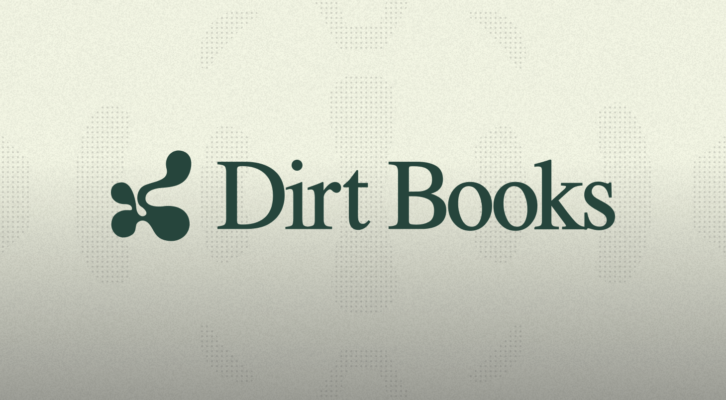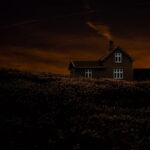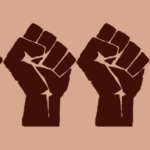“I’m in my decadent years,” Tariq Goddard told me early on in our conversation. I was at my home in Brooklyn; he was on the other side of the Atlantic, in his study at a home in rural Yorkshire — which also happens to be the location of High John the Conqueror, his head-spinning new work that blends elements of the police procedural with psychedelic folk horror. Imagine David Peace’s Red Riding Quartet gene-spliced with Ben Wheatley’s film A Field in England and you’ll have a good sense of the aesthetic at work here.
At the heart of Goddard’s novel is a rural town where children are going missing. As for what this has to the plant that gives the novel its title, its potentially supernatural qualities, and a cult band called Acid Horse — well, you’ll have to read the book to find out. It’s a gripping read, full of unexpected tension — some of which Goddard elaborated upon when we spoke via Zoom earlier this fall. An edited version of our conversation follows.
The area where you’re living is where High John the Conqueror is set, right? For how long have you been living there?
I’m not a local. I’m an import to this area, but I’ve been here since 2008. And prior to that, I lived in London for 30 or 31 years. So I suppose you could say that it took me over a decade to write about my immediate environment. And also it took me seven novels before I was ready to write in first person or use the “I” for a novel. Yeah. So neither of these things — which I think are pretty common for novelists — were the positions I started with.
What was it about the region that led you to set this novel there?
I think I’ve got a resistance to doing things that would come very easily, because it’s easy to do them badly. And despite living in this area, I couldn’t put it to use in my fiction. There wasn’t a story that I wanted to tell that was sympathetic with all of it. So I didn’t, I didn’t try and shoehorn it or rush it. It was, I suppose, more to do with the organic growth or emergence of the idea than a “Eureka!” moment where I understood that this was the perfect setting.
I had a number of ideas in my mind. I wanted to write a story about transcendence — its importance to people, its value, its explanatory power for life. And also its importance as part of human motivation — be that in religion or drug use or just day to day serenity.
So there was this idea that there was always going to be a novel I wanted to write that wasn’t a work of philosophy, but would address this with a really exciting narrative. I wanted to write in the first person; I felt confident at last that I could use it and employ it abruptly, and in a really inventive way. I’d also gotten to a point in my writing life where the first person was going to enable me to do things I couldn’t do writing third person, so I wanted to put that to use.
And I’d enjoyed True Detective, and had — without anything very specific in mind — a feeling that I would like to do for the New Forest and South Wiltshire and Salisbury Plain what True Detective did for the Louisiana bayou and California. A story with a close relationship to landscape that influences and shapes outcomes and the characters’ lives. Those were all percolating away, but I didn’t want to force it. And then after 2016, the political events that were occurring, were something that I wanted to feed obliquely into the story that I would do next; have them inform the book, but the book would not be about them. I had about five or six different ideas, and the catalyst was my deciding that I wanted to write about who I would be if I hadn’t become who I, who I am and who I’d become if just certain key things were different, but that it was still me.
Having written a really long book, set over three generations — Nature and Necessity — I wanted to write something tight and exciting and really taut that could encompass all of these things. Then, I just waited until a moment where I absolutely couldn’t help it and had to write it. As you know, I run Repeater and Zero again as well. I didn’t feel like I had the energy levels to pull it off until I gave myself a bit of a push and then it all came, it had been waiting for ages. Once I got out of the starter’s tracks, the light began coming in and I realized I was doing something quite magical, and that my unconscious was already desperate to get this story underway. So, not a single “Eureka!” moment; a number of stuttering “Eureka!” moments over about four years is the untimely truth and answer, I’m afraid.
It’s funny — I hadn’t thought of the True Detective connection, but now that you mention it, I can remember early on in the discussion of the show, when Thomas Ligotti’s writings came up as one of the influences for it, wondering if things might take a turn into the overtly supernatural.
I like the way that it confounds genre and easy categorization because usually to do so in writing means death. Most of the modern fiction I love doesn’t do that. It belongs outside of genre, and it just engages with and employs genre to tell the kind of story it needs to. What I enjoyed about True Detective was that, quite clearly, it had no respect for dominant reality as it’s encountered in most television or fiction. Metaphysical assumption seemed to be built into the thing. This wasn’t a materialist story. People were time traveling; clearly evil as some irreducible force was a character in it. It didn’t feel like it needed to explain itself any more than David Lynch would — because in life, when you encounter these things, you don’t encounter them with some overarching theory.
Not unless you’re extremely dogmatic and looking to filter everything for a very narrow worldview. You encounter these things to your amazement and surprise. I enjoyed the way that True Detective was relaxed enough to bring in elements that normally would have to be restricted to a certain type of book or certain type of film, and you would know that that was what you were doing so different laws would apply. Instead, it wanted to make something very literary and ambitious out of these parts and integrate them into a story without having to justify why or make the entire story subordinate to that, either.
I wanted that religious and supernatural sensibility in this story, too, without this being a horror novel anymore than it’s “just” a crime novel. I’ve nothing against horror or crime, but this isn’t just either of those things.
Earlier, you talked about wanting to write from the perspective of a character who would be similar to you if you had not become a writer. Is that where the police procedural aspect came from? Could you see another world in which you worked in policing as opposed to being a writer?
I don’t think there are many people that can be running left-wing publishing imprints that could see themselves in this.
It’s an odd juxtaposition.
It’s one of these things that comes after you’ve stopped pretending to be what you might have liked to have been and that you actually have to address on the basis of what you’ve already done. Which means that I’m not gonna get a phone call from Number 10 Downing Street asking me to save England from the Conservative Party. [Note: this interview was conducted before Liz Truss resigned as Prime Minister. Perhaps the odds of this have changed since then. -TC.] I haven’t become a political figure, which might have been some fantasy I entertained as a youngster.
At a certain point in my life, people stopped asking me whether I was in a rock band or if I was a DJ and they began asking me, “Are you a policeman?” And I thought, Christ, what different vibe am I now, in middle age, sending out that I’ve gone from most people’s idea of cool to most people’s idea of oppression?
I noticed there was something changing in middle age and given what self-knowledge I can claim to possess, I would say that detective would probably have been the path not taken and more likely to have been than the head of General Motors or member of Parliament, or the drummer in some very credible rock group. Those were fantasies.
What I was trying to consider is what would’ve happened to me if certain features of mine didn’t develop — if my whole emotional state was frozen in my early twenties, and that I became afraid of being open with people rather than seeking to be open with people, that I assumed connections instead of looking to make them. If you are a writer, you know there are ways in which you’re practical, but you haven’t chosen a nuts-and-bolts practical life.
What if I actually wanted to engage in life and not address eternity in my novels, but deal with concrete matters of fact — and yet still remain as much me as possible. That seemed to me to be an interesting literary exercise, as well as something I needed to do. I don’t see psychiatrists; I don’t seek therapy. I self-medicate with alcohol on the weekends and I write novels. So that was my path to working and, in doing so, working out more about why I have had the life I’ve had.
To go back to your earlier early questions of when all that came together, I understood how I could draw this part of the countryside, that is an extraordinarily mystical and unusual place. I mean, just to give you an idea where my study is, it looks out on some of the places that are in the book. Gallows Hill, Hanging Hill. There’s a first century mizmaze over there that’s connected to the ley lines that run through Stonehenge — that run through our television room, under my study. I knew all of this stuff would be powerful building blocks to tell the sort of story I wanted, but they couldn’t be the story; they needed to be part of it. I felt like their time would come and that in telling my story, I’d also say something about this whole area that’s been in literature, but not been in much literature recently.
There’s been a lot of discussion and debate lately about the nature of policing. What was it like to be writing a book where most of the central characters are part of a police department while that debate was happening?
The police are kind of reluctant heroes. To be clear, I spent my 13th birthday in a police cell. I have every reason to be suspicious of the police, to dislike the police, to feel like the police don’t have the moral authority that they claim to have. You have a Mar Marxist definition of what the police are and it’s juxtaposed to what a rural police unit is like in practice. So I’m not ignorant, either of the view that the police are no more than a veneer for capitalist oppression, or the standard line in the country, which is that they’re faithful public servants that do a bad job and get no respect for it.
I’m not a utopian. I think there will always be prisons. There will always be police, there will always be rancor and conflict. Even in some as-yet-unimagined anarchist paradise, they would still be there. I don’t believe in human perfectibility on earth, so I don’t think that the Marxist analysis is a complete one. And I also think that the police are probably one of the few state-run, centralized bureaucratic organizations where the left pours opprobrium and hatred, and gives vent to feelings that they never would to ambulance drivers or even soldiers, far less nurses or teachers. I’m not saying that the police don’t at times deserve this, but I think that they have become a kind of unthinking demonized bogeyman for the left.
I think this falls short of an accurate depiction of what the police are. While I wanted to write a novel that did not idealize or correct the sort of ire directed at the police — which, as I said, I think is often justified — I wanted also to write about people who, a lot of the time, are doing sensible things that are societally necessary. Having to clean up the mess that modern capitalism leaves is often a thankless task, but there are people in there motivated by good and decent reasons; they’re not a species apart from other civil servants.
I wanted to do justice to the different types of people that can be in the police. In this novel, there is a conspiracy going on. There is police brutality. There is appalling cynicism that allows these disappearances to go on unchecked. But I didn’t want that to be the whole story.
One of the running motifs in your novel is a cult band who factor into the conspiracy at the center of the book. At what point when writing it did the band enter the picture? And what was the process of creating a fictional band like?
If ever there was a record that could compliment this novel, I was watching Hawkwind, Solstice at Stonehenge 1984. My first festival was in 1990, but compared to this — it was Mad Max. You could smell open lavatories, shit everywhere, all the rest of it. Having always loved music, I wanted to write about some of the themes that I’ve dealt with as a publisher. I don’t know how many Repeater or Zero Books you’ve read, but something that’s come up again and again is hauntology, the meaning of the distant past. The fact that history seemed to stop at some point in the mid nineties, musically, where we stopped inventing new forms and began to live in Retromania — that was something I wanted to deal with in fiction.
I thought that a band that encompassed the different stages of rock and roll, from a kind of prototype Genesis/Gentle Giant thing to becoming an anonymous techno outfit, that would be part of the cultural history of our country. The kind of people that were in this band Acid Horse, they’re the people that I see in the supermarkets, in the pubs, in pub car parks. They inhabit this area; this is their world. I wanted to write something about the disappointment and the failure of the way that music seemed to be a force that could actually culturally change the world.
I wanted to just talk about belief and eventual disillusionment. Now that history’s stopped, what happens to all these people? I can remember the first time I was at some big venue and I saw that Bob Dylan was playing again, and he was sandwiched in between somebody like Take That or Boyz II Men. The point was, suddenly he’d become historically unmoored. This wasn’t a step towards greater enlightenment. He had become another entertainer like any other.
So many of these people believed that music was this march towards a better society, as ridiculous and naive as that might sound. That it could actually affect the political superstructure, because that was how important culture was. That’s how important music was to the people who liked it and the people who informed it, who thought that its transformative power to the world was as important as they believed it was to them. What happens when someone draws a line through all that and says, “All the political projects are over; you lot were wrong about everything. You are just a branch of the entertainment industry and not a particularly engaging one.”
These people don’t just disappear. They’re sitting in the pub brooding. There’s a guy in a pub in Salisbury that was in a band that supported Nirvana and in 1992, that was the best thing he’d ever done in his life. In 2022, thirty years later, it’s still the best thing he’s done in his life, but the pieces have changed. The context’s different.
I wanted to talk about a band as a mirror to changing society, but also as a sort of vehicle for the ebb and flow of history. We’re living in a time where music doesn’t seem as pivotal, where art doesn’t seem as important. Nobody with a straight face would want to make great claims for its practical use again. And yet we still love it.
In terms of the idea of music being used to change the world, policing as a way of affecting the world, and the ritualistic magical elements of this book, do you see them all as conflicting or overlapping attempts to either restart history or have an influence on whatever’s left of history?
It’s a story about different approaches. Policing is containment. How do you keep a lead on this hell, this slow car crash where the tectonic plates met in 2016 with Brexit and Trump. Then you’ve got the actual High John the Conqueror, this drug that allows you to physically dematerialize and reject the world and the pain in that way. And then there’s music which basically at its best, is like drugs in that at their best they’re more than mere entertainment; they’re sources of information. They don’t show you how a better world is possible. They show you how you can grow out of the form you’ve been assigned or given. Neither music or drugs, for me, are to do with blind hedonism. I’m still with the Blakean project here, which is that knowledge this way lies.
I think the policing side that’s gravitationally orientating everything is the sort of other side of the coin, which is that without some sort of grasp of dominant reality without one foot in it, we’re helpless ,and we wither and die. Policing is the containment strategy that we all have — you know Foucault’s famous saying of killing the fascist inside yourself. But it’s how we cope. It’s how we manage. It’s us doing the bare minimum we have to do to survive. And because I recognize that we’re damaged and that we have base instincts and all the rest of it, I couldn’t imagine a world without somebody having to do the necessarily disagreeable jobs.
But there’s this other aspect of ourselves that is yearning to fly over all of this and move towards the light. And it’s an incomplete picture of human life that doesn’t address both of these. Although plenty of people write about them, they don’t write about them in the same place or integrate them into the same story, which is what I wanted to do here.
I thought having them all meet in the figure of a policeman rather than a shamanic witch doctor or an eco-activist on the run from a major corporation. And I gave it a very practical setting, which is where most of us experienced transcendence, perhaps — long walks, too many beers in a pub garden, take your pick. Having a nap in the afternoon and hearing something that reminds you of being four years old. So I didn’t want this setting to be prohibitive of life as most of us encounter it — certainly around here in this area. But you know this area, in a way, could be anywhere too.

















